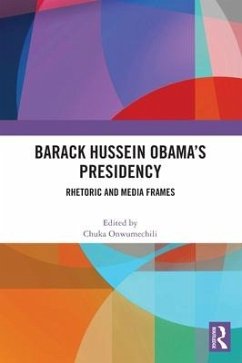
The Modern Presidency and Crisis Rhetoric
Versandkostenfrei!
Versandfertig in 1-2 Wochen
87,99 €
inkl. MwSt.

PAYBACK Punkte
44 °P sammeln!
This volume examines how presidents from Truman to Bush rhetorically approached and managed political, military, judicial, legislative, and economic crises during their presidencies. Editor Amos Kiewe assembles new essays by communications scholars who look at rhetoric initiated during national crises, and account for various rhetorical developments affected by crises, changes in presidential rhetoric, and rhetorical and situational crisis constraints. Their studies suggest similarities in rhetoric in different types of crises, and yield resources for postulating patterns of crisis rhetoric. E...
This volume examines how presidents from Truman to Bush rhetorically approached and managed political, military, judicial, legislative, and economic crises during their presidencies. Editor Amos Kiewe assembles new essays by communications scholars who look at rhetoric initiated during national crises, and account for various rhetorical developments affected by crises, changes in presidential rhetoric, and rhetorical and situational crisis constraints. Their studies suggest similarities in rhetoric in different types of crises, and yield resources for postulating patterns of crisis rhetoric. Each chapter's author presents a crisis rhetoric case study, analyzing initial strategies and tactics, shifts in rhetorical tactics, adjustments of discourse to particular phases in the crises, and unique rhetorical approaches designed to accommodate unexpected turns of events. The contributors discuss how presidents use rhetorical inventions, flip-flops, face-saving posturing, and even silence to diffuse crises. Specific topics include Eisenhower's response to the constitutional crisis in Little Rock, Kennedy and the Berlin Wall crisis, Johnson and the Kennedy assassination, Nixon and Watergate, and Bush and the Persian Gulf Crisis. Recommended for political scientists and communication theorists.












